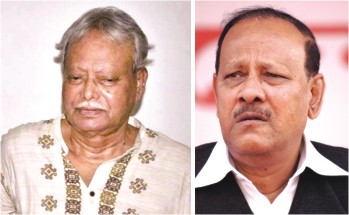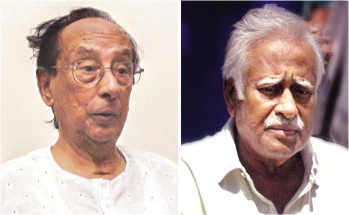
Inside
|
Country at a crossroads, nation cross-eyed Shahnoor Wahid reflects on the follies of our political parties Cynics are going around saying that the country is at a crossroads, and the nation cross-eyed. Can we really blame them? Not really, if we can take an honest opinion on the basis of its intrinsic merit. Look at the state of politics, political parties, and the standing of the politicians in the country. Nothing to write home about. Politics is in a moribund state and politicians are afflicted with a form of acute "characterosis" (a type of cancer that nibbles at the very root of one's character, metaphorically that is); the state of emergency is likely to hang around a bit longer; national ID card project is yet to get off the ground; greater part of the landscape is under water; crisis of fertiliser causing farmers to go berserk; prices of essentials jumping around like kangaroos; traffic management in the metropolis has gone kaput. Everything, therefore, boils down to the crude reality: Remnants of bad governance linger on, and there is no sign when good governance will cease to be so elusive. One tends to sigh in solitude and contemplate: Why have we come to where we have come today? The answer remains lost in the mess created by the corrupt and inept politicians and bureaucrats of the country.
What BNP did but should not have done Today, BNP has imploded on its hollow foundation thanks to the mindless, unstoppable corruption of the front-ranking leaders and the indifference and denial mode of the now imprisoned chairperson Khaleda Zia. Today BNP leaders remain divided and in disarray as ever, and yet grabbing at every opportunity to prove their innocence. What Awami League should have done but didn't AL party supporters and mid-level leaders have been critical of Sheikh Hasina's tantrums for a long time, and they had asked her point blank in a meeting in March this year why she took some unilateral decisions on certain national issues keeping most of them in the dark. It was possibly the first ever attempt at practicing democracy within the party, which, reports say, did not make her too happy.
A number of her decisions had evoked ire among the leaders, and the same feeling percolated down to the mid to lowest level leadership at the grassroots. Some jittery leaders seized the opportunity to question her as to why she gave a specific timeframe for holding election (in June 2007) to the caretaker government. Most of the senior AL leaders had no hunch about a party delegation going to the Election Commission office with the demand. According to insiders, the party seniors were in favour of the rather safe stand of "election as soon as possible." The next volley was on the question of signing of the now defunct, but nevertheless infamous, MoU with Bangladesh Khelafat Majlish. As per the agreement, if AL had come to power, the Majlish would have had the power to enact laws to give legality to fatwas (instant edicts given by the Islamic clerics). Finally, on the eve of her departure for the US in mid-March, Sheikh Hasina had given the statement that if voted to power in the coming election her party would give legality to every action taken by the current interim caretaker government. Apparently she had failed to grasp the political implication her statement would have in the future. Awami politics seems to be still in its adolescence. It has to come of age. Shahnoor Wahid is Senior Assistant Editor, The Daily Star. Photos: Star |

